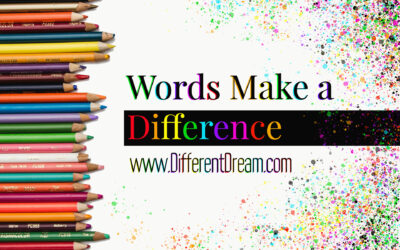To Grandma from your Grandchild with Special Needs

Much of Mother’s Day week at Different Dream is devoted to moms of kids with special needs and rightly so. But today’s post is devoted to the grandmas who embrace their grandchildren with special needs and offer invaluable support to mommies. To honor grandmas, whose grandchildren can’t say how they feel, grandma and guest blogger Kathy Guzzo wrote this letter to grandma from a child with special needs for them. Grandmas, this one’s for you.
To Grandma from your Grandchild with Special Needs
Hi Grandma,
It’s hard for me to find the right words, so I decided to write you a letter. Well, Mommy is writing what I say, since it takes a long time for me to write letters that mean words.
I like you, Grandma, because you make Mommy and me feel special. You don’t make me feel like I’m bad, or make fun of me, or yell at me. Instead of making me play games I don’t want to play, you’ll join me in what I’m doing. You don’t ask me a lot of questions and are okay when I answer yes or no. Somehow you know whether or not I want to talk. Talking is so noisy, but I feel safe having someone just sit in the room with me. Sometimes it calms me down.
I like what you do for Mommy too. When you hug and laugh with her, she smiles on her face. Mommy doesn’t show her smile very often. It’s pretty. I like when you bring different foods over, even when I don’t like them. I’m a picky eater, but you bring Mommy’s favorite. Mommy likes when you talk about when she was little or ask her about the books she’s reading instead of talking about me. And boy does she love white daisies. That’s probably why you bring them to her sometimes. You’re nice to help Mommy with all her jobs around the house. When you help, she gets done faster and doesn’t seem so tired.
I like it when you come over and then Mommy leaves, too. Because sometimes Mommy and I just need to be apart for awhile. Besides, when it’s just you and me at home, we have fun. When mommy comes back it’s like she took a nap. I don’t want mommy to be tired all the time.
Mommy told me that you are her mommy. Mommy doesn’t lie so I know it’s true. Thank you for being her mommy.
I’m out of words and Mommy’s crying a little. Even though she’s smiling, too.
I love you, Grandma!
Your Special Grandchild
Have You Written to Grandma from your Grandchild with Special Needs Yet?
If you haven’t yet, you should. Because I’ve been a grandma for 2 1/2 years now and know much grandmothers love to hear from their grandkids. Whether it’s a card, a letter, an email, Skype or Facetime, or in person, remember your kids’ grandma this Mother’s Day. Or leave a shout out in the comment box for a grandparent who’s making a difference in the life of your child with special needs.
Do you like what you see at DifferentDream.com? You can receive more great content by subscribing to the quarterly Different Dream newsletter and signing up for the daily RSS feed delivered to your email inbox. You can sign up for the first in the pop up box and the second at the bottom of this page.

By Kathy Guzzo
Kathy Guzzo and her husband live in Northern Illinois and have 4 adult children. One of her daughters was diagnosed with lupus and Epstein Barr Replication as a young adult. Another began struggling with depression and OCD in her mid-twenties. She understands the need for her daughters to be able to make their own decisions regarding their health, but the nurturer in her sometimes has a hard time letting go. She desires to direct others to the peace and hope that God has abundantly available for them.
Subscribe for Updates from Jolene
Related Posts
We Need Community while Parenting Kids with Disabilities and Special Needs
Sandy Ramsey-Trayvick explains how we need community while parenting kids with disabilities and special needs.
The Impact our Words May Have on the Children We Serve
With narratives from her past, Jolene demonstrates the impact our words may have on the children we serve.
Unexpected Grace Given and Received by Caregiving Parents
Looking at her difficulties differently led Karen Wright to experience the unexpected grace given and received by caregiving parents.






0 Comments